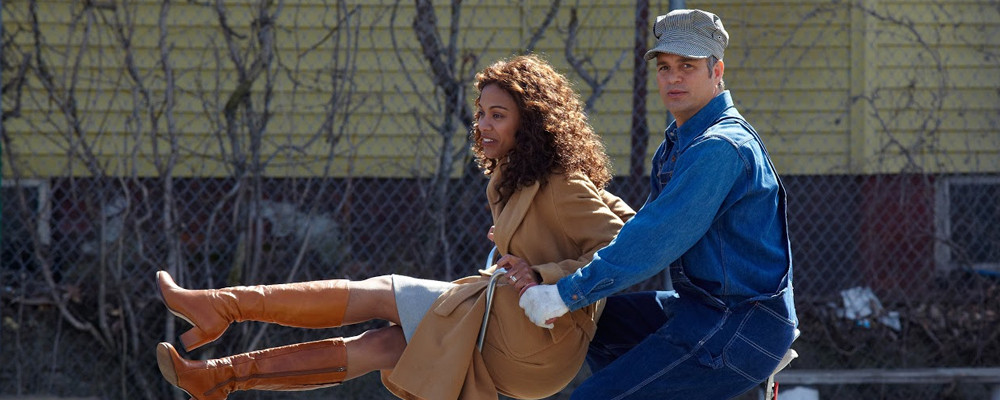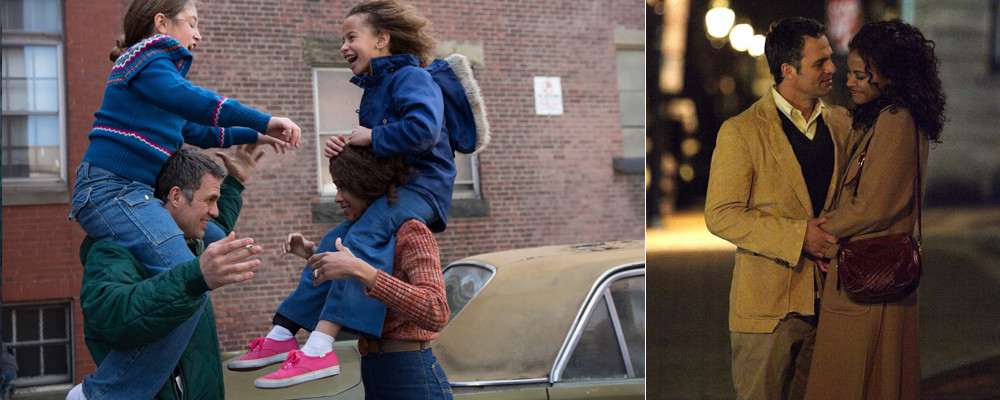‘Infinitely Polar Bear’ Writer/Director Maya Forbes Talks About Her Deeply Personal Film
Sandra Miska
“Infinitely Polar Bear,” an upcoming indie drama about a family struggling to cope in 1970’s Boston, is a very personal film for writer/director Maya Forbes. The character of Cam Stuart (Mark Ruffalo), a bipolar man who takes care of his young daughters while his wife earns her MBA in New York, is based on her own father, while his wife Maggie (Zoe Saldana) is based on Forbes’ mother Peggy, and their daughters Amelia (Forbes’s own daughter Imogene Wolodarsky) and Faith (Ashley Aufderheide) are based on Forbes herself and her musician sister China Forbes.
The Cambridge, MA native recently sat down with Entertainment Voice to discuss her writing process, how it was directing for the first time, and the role her family members played in making her dream film a reality.
Entertainment Voice: You’ve said that you were the only person who could’ve directed this film. Was directing something that you always wanted to do? Or was it something you only considered for this script?
Maya Forbes: when I was little, I think I always thought I’d be a director, a writer and a director. And then as I got older it seemed really scary, terrifying to take on that much ownership, to throw yourself into something like that. It also seemed like the ultimate creative thing that I could do, but it also seemed overwhelming. I’m sure other people could’ve directed it, but I felt that I knew how much life and energy and humor I wanted to have in it, and pathos; I wanted it to be very warm. So that is the thing that made me not want to give it to someone else, because what if it came out and it’s dreary, or maudlin, or heavy? I didn’t want that. So I forced myself into a corner where I had to direct.
EV: Has that been your experience in the past, where you handed over scripts and they were turned into something far different than what you had envisioned?
MF: Sometimes, yeah. I mean I never cared about any script as much as I cared about this one, but still you go, “This scene has no life in it,” or whatever it is. “That could’ve been funny, but look how that was done.” I’ve definitely had that, but sometimes you see something you’ve written and you go, “Wow.” Often when I see actors read what I’ve written, I’m just amazed at what they bring to it. There is that. But anyway, I felt like the tone was a tough tone to get right. I didn’t know if I could get it right either, but I felt like I needed to try, because if I gave it to someone else I’d feel like a huge failure if they didn’t get it right, so I needed to try and see if I could get it right.
EV: How did your family react when you told them you were making a film based on your own life?
MF: I showed everyone the script. I had endured the feedback from them. I think once my mother, and my sister and my father’s siblings felt heard, they were all quite excited for the film to be made. They really felt – my father died in 1998 – there was a general feeling that Mark Ruffalo did a really great job capturing the essence of who my father was. He made him palpable and alive for us again.
EV: How long did it take you to write the film?
MF: It took a long time. I didn’t sit down and write it; I wrote scenes all over the place, from little kid to big kid. I wrote scenes from when I was in college. I wrote all these scenes. And then, probably once I sorta honed in on the time I was going to actually cover, this period during which my mother went away and my father took care of us and how there were disastrous elements, but ultimately we figured out this way to be a family in this unconventional way, it probably took a year or two. …It felt like a really long time. It was more of a personal thing that I was doing. And it wasn’t about, “I’m going to see this script!” It wasn’t like that at all, so it was a different experience for me, because often times I’ve written spec scripts to sell them, but I never have. I’ve worked a long time in the business, but I’ve never sold a spec script. Anything I’ve really wanted, I’ve never wanted to five it up.
EV: So the other scripts that were made into films you were hired to write?
MF: …Either I’ve written movies for studios, which were their projects and I was hired to write them, or my husband [Wallace Wolodarsky] and I made this movie “Seeing Other People” that was a spec script we wrote and my husband directed and we made that independently… I always want to be attached to [my spec scripts] somehow. I never want to give them up.
EV: Would you direct again?
MF: I hope so. They say that women have a really hard time directing their second feature, particularly. It’s hard to get to direct the first feature, but the second feature is even harder. I don’t why that is, but I definitely want to direct again. Absolutely.
EV: What was it like directing your own daughter?
MF: When we were on the set, we were mother and daughter and we had a shorthand. Anything you can do when you’re making an independent film like this that makes it easier, you gotta do. I knew she could do it because we had done a table read where she read [the part of Amelia] with Mark Ruffalo and Zoe Saldana… I had this 90-minute audition basically, so I knew she could do it. So basically, on set it was a great creative collaboration for her. I didn’t feel like I was bossing her around. I felt like she was giving everything she had to it. She was really into the challenge of it. It was emotionally taxing for her and for me. It was a bizarre and interesting and wonderful experience [laughs].
EV: Was the film shot in Boston?
MF: Providence. It takes place in Cambridge and Boston, but it was shot in Providence, Rhode Island.
EV: How was it going back east?
MF: I loved it. For me, to make this movie, it had to be shot in New England. Because of tax incentives [others suggested], “Well, maybe you can do it in Louisiana or New Mexico.” But I just felt that it was just not going to happen. The other thing is I didn’t think I could recreate anything, because it’s a movie where I have to find what I’m shooting. It has to be there right in front of me, and I don’t want it to have no scope. I want to be able to embrace the world that I’m in. so it has to be in that part of the world. … [Providence] looks like Cambridge and Boston from the seventies. Not all of it, but there’s a lot of it now that could evoke that period.
“Infinitely Polar Bear” opens June 19 in Los Angeles and New York.


